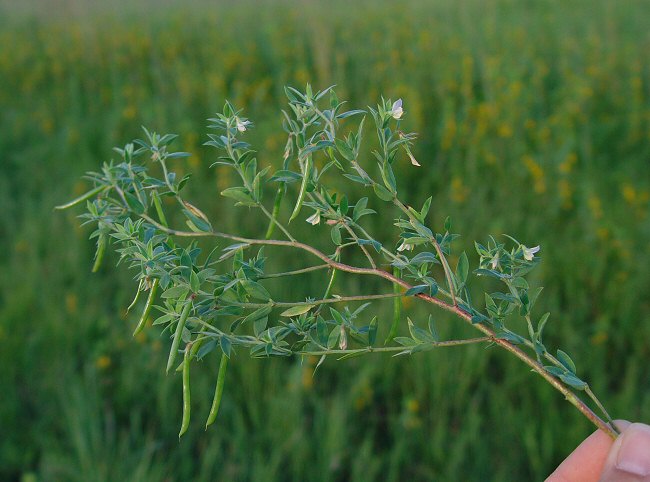Acmispon americanus (Nutt.) Rydb.
Prairie Trefoil

Native
CC = 6
CW = 3
MOC = 14
© DETenaglia
Acmispon americanus (Nutt.) Rydb.Prairie Trefoil | |
 |
Native CC = 6 CW = 3 MOC = 14 |
© DETenaglia |
|
Family - Fabaceae/Faboideae Habit - Taprooted annual forb. Stems - Ascending to erect, often branched and bushy, pubescent with fine spreading to ascending hairs.
Leaves - Alternate, pinnately trifoliate or the upper leaves simple, petiolate, the petiole 0.6-2.0 mm long. Stipules minute, sessile, circular to bean-shaped glands. Leaflets 6-20 mm long, 2.5-5.0 mm wide, elliptic to lanceolate, angled to a short-stalked base, sharply pointed, the margins entire, finely hairy, the surfaces moderately to densely and finely hairy. Terminal leaflet with the stalk 1-4 mm long, symmetric at the base; lateral leaflets with the stalk 0.2-1.5 mm long, often asymmetric at the base.
Inflorescences - Axillary, of solitary flowers in most or only the upper axils, the stalks 5-20 mm long, hairy, with a simple, leaflike bract and a pair of minute glands at the tip, the flower with a stalk 0.2-1.0 mm long above the bract.
Flowers - Calyces finely hairy, the tube 1.5-2.0 mm long, conic, the lobes 4-6 mm long. Corollas papilionaceous, white to pale pink, often with a dense pattern of darker pink nerves, the keel often yellowish toward the tip, the banner 5-7 mm long, 3.5-5.0 mm wide, the wings 4-6 mm long, 2-3 mm wide, obovate, the keel 4-6 mm long, 1.5-2.0 mm wide, boat-shaped, fused nearly to the tip. Stamens 10, all of similar length, 9 of the filaments fused and 1 free, the fused portion 3.5-4.0 mm long, the free portion 1.0-1.5 mm long. Ovary 2-3 mm long, the style 1-2 mm long, slender, slightly curved, the stigma small and terminal.
Fruits - Legumes to 4 cm long, 2-3 mm wide, linear, beaked, terete, dehiscing by 2 valves, these green at maturity, twisting spirally after dehiscence, mostly 5- or 6-seeded. Seeds 2.5-3.2 mm long, 1.5-2.0 mm wide, more or less kidney-shaped, the surface olive green to reddish brown, mottled with darker brown or black, smooth, somewhat shiny.
Flowering - May - September. Habitat - Prairies, glades, limestone slopes, bluff-tops, roadsides, railroads. Origin - Native to U.S. Other info. - This species can be found in a handful of Missouri counties and is most common in the prairie areas of the southwestern portion of the state. The plant can be identified by its hairy, much-branched stems, trifoliolate leaves, and small pinkish flowers. The flowers are whitish when they first open and then fade to a dark pink by late afternoon. Each flower only lasts one day and then quickly sets a fruit. Photographs taken at Homestead National Monument, Beatrice, NE., 8-14-06. |